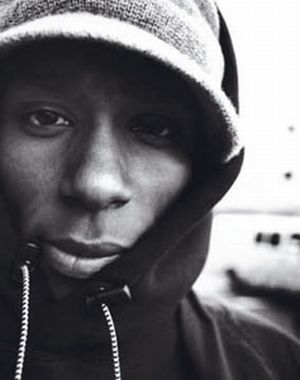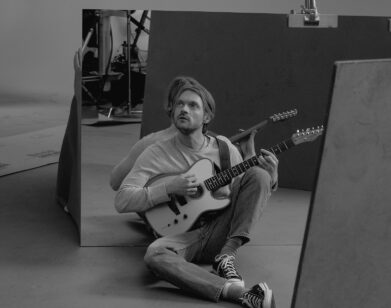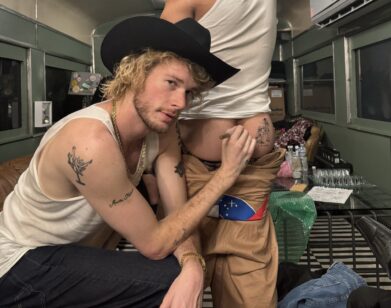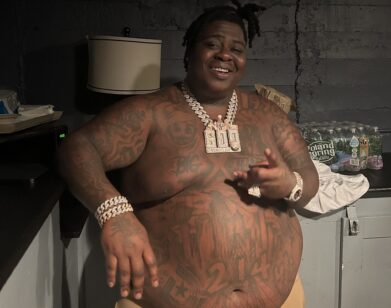House Music: Mos Def

Â
Â
Â
The Ecstatic is the appropriately titled, fourth solo album from one of Brooklyn’s finest MCs to ever release a song called “Bin Laden”: Mos Def. His voice, which you might also recognize from his acting in Talledega Nights or Monster’s Ball, filled Downtown Records’ SOHO office as his team watched the first edit of his new video for the album’s single “Casa Bey.” “Casa Bey” samples “Casa Forte,” a 1977 song by Brazilian funk band Banda Black Rio. After watching the video, he was sat down with Spank Rock, who’s currently finishing his second album with Downtown. Mos Def inspired Spank Rock since since he first heard him on De La Soul’s “Big Brother Beat,” and, says Spank Rock, “His unconditional love for music and community resonates with me to this day.” As they both are putting out new material second album, the seasoned artist’s words could not have come at a better time.
SPANK ROCK: Why’s it called “Casa Bey?”
MOS DEF: The original [song by Banda Black Rio] was called “Casa Forte,” which means “strong house.” And I wanted to call it “Casa Forte” because I wanted it to be as close to the original as possible, but the band, the dudes wanted me to come up with my own shit. “Casa Forte” was too close to the original. And I chose “Casa Bey” because that’s a family name, but this is after the recording of the song. During the recording…
SR: But is this just you rapping over the straight song?
MD: I play the piano and the keys at the end. Also, I looped that rhythm part, like the three times at the beginning.
SR: Are you playing a lot of the instruments on the album?
MD: No, not on this one. I play guitar and keyboards, synths. On “Casa Bey,” I play the keys.
SR: Who are the collaborations on the album?
MD: Georgia Anne Muldrow, from Los Angeles. She’s an amazing person and artist. Also, [Talib] Kweli and Slick Rick. I wanted to get Jay Electronica, Black Thought, and Dave from De la Soul, but they were telling me that “Casa Forte” was a difficult cut to rhyme to. It ended up just being my tune. I wanted to get other people on it, but everything in the universeâ??and I don’t want to sound esotericâ??has been pushing it to be my song. For instance, Jay, Black Thought, and Dave were down to be on the track, but I had to push them. And I let it be what it is and it’s fine. I’m really proud of the song and feel blessed to have the opportunity to be the screen for that vibration, for that pass through on the world. I’m just very happy. Ego aside, it’s just like, “Wow, that just happened.” It just happened to me, and it will happen to the world.
SR: What are the main issues that you wanted to approach with this album?
MD: Life, Love, just observations. It’s not a super-defined narrative, its just raw… from a sincere place. Also, I feel like being into the beat of your own drum has become too prominent in the culture. I have no confidence issues with the impact or the quality of the music. No one in hip-hop, before this point and to this point, with all due respect, has done this. I feel like I was the only person who was capable of making this type of music in this type of way. I don’t rap like nobody, I don’t try to sound like nobody.
SR: I would agree with that.
MD: This music has a long lasting positive impact on the world. And how this music will sound in 10 years. When people ask my kids, “What did your pops do?” I want it to be like, “He got down like this, he did this.”
SR: You’ve been one of my biggest influences since I was 14, when I started rapping, and you’ve always put out something that doesn’t sound like anything else. You have your own direction. This is your third solo album: How have you changed now?
MD: I’m growing as an individual, but your always growing. All of my albums are snapshots of where I am artistically. With this album, I’m at this expansion point in my consciousness and my awareness. Things are becoming clearer and clearer to me.
SR: I feel like Kanye West has been influenced greatly by your work. For instance the singing and his voice…
MD: People always say that to me and I never see it myself. Even considering that, I’m doing it on a different level for myself. It’s another motor for me.
SR: One of the things that I picked up from you personally is that if I’m not smiling while rapping, then I’m not doing my job. I remember always seeing you in the beginning at a show in New York, and you were smiling the whole time, climbing up the walls and shit…
MD: I like to have a good time and enjoy myself. The music is uplift. African art is functional, it serves a purpose. It’s not a dormant. It’s not a means to collect the largest cheering section. It should be healing, a source a joy. Spreading positive vibrations. Coltrane, Marley, Hendrixâ??that mindset.
SR: Those people that you named seem really self-destructive, Hendrix and Coltrane. It seems like your pacing yourself to avoid that.
MD: I have plans to stick around, even when I’m not around anymore (laughing). Even when I die I won’t stay dead. The vibration is the key thing. If I’m not the hottest, then let me be vital. If you’re necessary you’ll always be in people’s pocketsâ??something that functionsâ??well.
SR: I’m trying to figure out how we can convey that to young kids: How is being an artist different from being a product?
MD: You have to get busy. There are so many things… I can’t control what people think. I’m not trying to manipulate people’s thoughts or sentiments. I write all the time. You have to experience life, make observations, and ask questions. It’s machine-like how things are run now in hip-hop, and my ambitions are different. I’m not knocking it, but I have my mind on another type of prize. There’s another way to achieve that [success] too. There’s another way with less congestion, less emissions. I’ve been spending my time building that road. You have to look for validation from yourself. Who wants to be the outcast? But you have to commit to who you are. Also, a lot of it is the manifestation of society and colonialism in the industry. Radiohead can be as avant-garde as they want and still have pop success, but if you’re black you have surrender yourself to the flashing lights … There’s a problem with those dudes man, they need to be chastised. And I know all those dudes too…
SR: Who are you referring to?
MD: The “topper-tops”, you know? They know who they is. The people who itemize this, and talk about what they’ll do to you if you talk about them and so forth. That has nothing to do with what my job is. I come to uplift the people. It doesn’t have to be fashionable. I don’t mind being black. I’m black out loud. It’s more than the people that they are, it’s the condition that they represent. I don’t hate nobody. I hate certain conditions that are inflicted upon the peopleâ??and they’re helpless with it. To me, the job of the artist is to provide a useful and intelligent vocabulary for the world to be able to articulate feelings they experience everyday, and otherwise wouldn’t have the means to express in a meaningful and useful way. It’s not that people have to “ball” less, it’s just that they need to do something good. This is what I wanted to tell XXL. They had this cute little girl asking me all these biographical questions, and I was like “what does this have to do with it?” Making people pretend they know me because they know where I was born. I just want to be necessary and do good works.
SR: Lets talk about the first album you released with Kweli, the Blackstar album, where you have a very strong message to go with the music. Like the young hip-hop spirit, like “I know what’s right”. It’s like being the little bastard teenager who’s saying, “Fuck off, I know exactly what I’m talking about.” With this album, I’m expecting it will be a little different. I’m expecting it wont be super-preachy.
MD: Blackstar wasn’t preachy. But compared to what was coming out, we were a sincere vibration. We just wanted to be professional artists. BIG and Puff were riding around in Bentleys, and it was dope, but that wasn’t us. We wanted to do what we do. We liked it and we enjoyed it. So it was good. I’ll be 36 this year. I ain’t here to waste nobody’s time, because I don’t want you to waste mine. I hope it’s a benefit to you, something useful to you aside from being some passive fan. The record plays, but you can’t talk to me, you can’t respond to what I say. So, while the record is playing, I try to leave some place for the people to feel welcome.
SR: One great thing about “Blackstar” was you had the video where you’re all just riding around in a van, scooping up different friends. I still behave that way.
MD: That’s Brooklynâ??the community caravan. We’re just having a good time man. Spread joy, spread love. We know how to operate with the lights out, actually. They turn them on, that’s cool. We know how to get around quite well in the dark.
SR: You’re a really funny dude a lot of the times, but you rarely put your humor into the songs.
MD: Yeah, I’ve noticed that too. I guess I’m a basically serious individual.
SR: When it comes to music?
MD: When it comes to everything. (Both laughing). I go hard; I’m a passionate person. I’m a lot of things, like most people are. Most people are dynamic. The focus is not on me though, I’m a screen. The aim is to always keep myself in the position where the screen is clear. I’m just keeping my ears up.
Mos Def’s The Ecstatic is out June 30. Look out for the new Spank Rock this fall.






